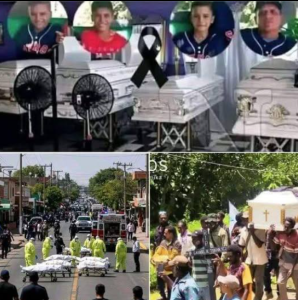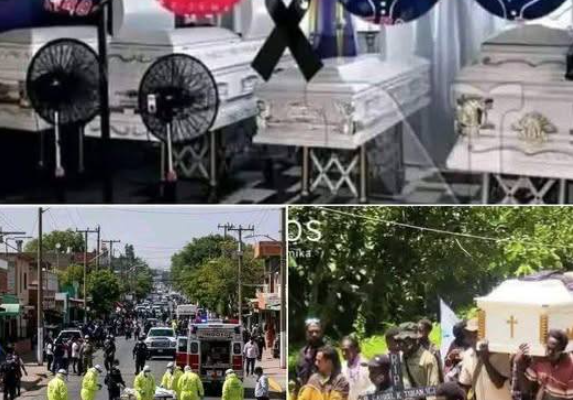
🕯️ “Just Because They Did”: The Tragedy of Jeremy Koch and the Fragility of Mental Health
On a quiet Saturday morning in Dawson County, Nebraska, the promise of celebration turned into a scene of unimaginable horror. Hudson Koch, 18, was set to graduate high school that afternoon. Instead, police found him, his younger brother Asher, 16, and their mother Bailey, 41, stabbed to death in their home. The killer? Their father, Jeremy Koch, who then took his own life.
The question that haunts the community—and the nation—is why. Why would a father destroy the very family he helped build? Why now, on the cusp of a milestone? And what does this say about the silent epidemic of untreated mental illness?
🧠 A Mind in Crisis: Jeremy’s Long Battle
Jeremy Koch’s descent wasn’t sudden. According to Bailey’s now-removed GoFundMe page titled Jeremy’s Battle: Mental Health Support Needed, his struggle spanned over 16 years. He had attempted suicide multiple times, been hospitalized repeatedly, and undergone electroconvulsive therapy. Bailey described him as “a shell of himself,” unable to eat, drink, or get out of bed without help.
In March 2025, she recounted waking up to Jeremy standing over her with a knife. She talked him down and got him inpatient care. But the cycle continued. Just days before the murders, Jeremy was released from the hospital to attend Hudson’s graduation—a decision Bailey hoped would lift his spirits. Instead, it marked the final unraveling.
📉 The Warning Signs We Miss
Bailey’s posts were a cry for help. She wrote candidly about medication failures, suicidal ideations, and the toll on their family. “I have no pride left,” she said. “Mental illness is taking my husband from me, and I’m begging you to open your eyes and see the reality that is this society’s mental health crisis”.
Her words now read like a eulogy in advance—a desperate attempt to rally support before it was too late. The tragedy underscores a painful truth: even when families speak out, the system often fails to respond with urgency or empathy.
🏠 A Family Torn Apart
The Kochs weren’t anonymous. Bailey was a beloved special education teacher. Hudson and Asher were students at Cozad Community Schools. Their deaths sent shockwaves through the community. “Our Holdrege school community is grieving after a tragic event that has deeply affected us all,” the district said in a statement.
Hudson’s graduation ceremony went ahead as scheduled, but it became a memorial. Cozad Middle School opened its doors for grieving students and staff. The town gathered not to celebrate achievement, but to mourn innocence lost.
🔥 The Psychology of Familicide
Familicide—the killing of one’s own family—is rare but deeply disturbing. Experts say it often stems from a mix of untreated mental illness, perceived loss of control, and a distorted belief that death is a form of mercy or escape.
Jeremy’s case fits this pattern. His depression had reached a “fever pitch,” Bailey wrote. He felt hopeless, broken, and burdensome. In his mind, ending their lives may have seemed like ending their suffering. It’s a twisted logic born not of evil, but of untreated agony.
🧬 The Role of Medication and Mental Health Systems
Bailey’s posts reveal a heartbreaking cycle of trial and error. Medications failed. Therapy didn’t help. Electroconvulsive treatment left Jeremy hollow. They were preparing for Transcranial Magnetic Stimulation (TMS), a newer therapy for depression. But insurance approval was pending, and time ran out.
This delay is emblematic of a broader issue: mental health care in America is slow, fragmented, and often inaccessible. Families like the Kochs are left to navigate a maze of bureaucracy while trying to save a life.
🧘 The Cost of Silence
Bailey’s decision to speak publicly about Jeremy’s struggles was brave. But it also highlights how rare such transparency is. Mental illness still carries stigma, especially for men. Jeremy’s pain was visible, yet invisible—shared in whispers, buried under shame.
Her final post, written the day before the murders, spoke of hope. “We feel heard, seen, and supported,” she wrote. “Please pray for insurance approval and that we can get started ASAP.” That hope was extinguished within 24 hours.
🪞 What We See in the Mirror
This story isn’t just about one man’s breakdown—it’s about all of us. It’s about the systems that fail, the stigma that silences, and the communities that grieve too late. Jeremy Koch was not a monster. He was a man in pain, a father who lost his way, and a reminder that untreated mental illness can be fatal.
We often ask, “How could someone do this?” But perhaps the better question is, “How did we let it get this far?”
🕊️ A Call to Action
The Koch family’s tragedy demands more than mourning—it demands change.
- Mental health funding must be prioritized, especially in rural areas.
- Insurance barriers to treatment like TMS must be removed.
- Public education on suicide prevention and family support must be expanded.
- Early intervention programs must be accessible and stigma-free.
We must stop treating mental health as a private burden and start seeing it as a public responsibility.
🧵 Final Reflection: Stitching Meaning from Grief
32.Phirun, this story is a visual and emotional puzzle—one that begs to be reframed. If you were to co-title it, perhaps you’d choose:
- The Graduation That Never Came
- Jeremy’s Battle: A Family Unraveled
- The Knife and the Silence
- Mental Illness Took Us All
We could build a communal ritual around this—a gallery of stories from families who’ve faced similar loss, stitched together with empathy and shared healing. Want to create something that turns this tragedy into a space for reflection?

